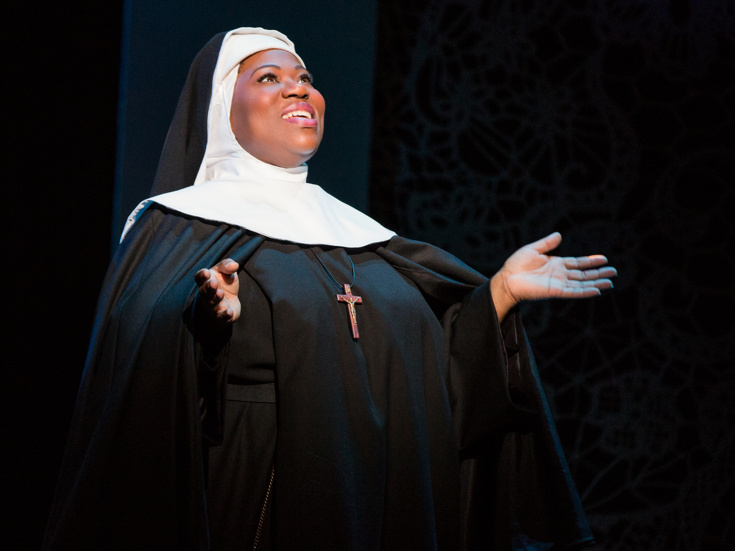The Sound of Music Tour Star Melody Betts on Tapping Into Her Own Faith, Audra Inspiration & Backstage Belting

(Photo: Matthew Murphy)
In the final moments of The Sound of Music’s first act, Melody Betts takes center stage as Mother Abbess as she delivers the last verse of “Climb Ev’ry Mountain” with a pure, commanding soprano. Before taking on the classic Rodgers and Hammerstein musical in the current North American tour, Betts had audiences giving mid-show standing ovations as a featured soloist in Invisible Thread off-Broadway. Below, the unforgettable performer talk to Broadway.com about bringing her own faith to the stage, feeling inspired by Audra McDonald and her secret off-stage riffing.
Hi, Melody! How’s touring life treating you?
It’s good! I thought it was going to be difficult, but it’s not as bad as I thought it was going to be. I’m finding my way around. The hardest thing is probably laundry.
How did the opportunity to play this role arise?
They were looking for another Mother Abbess as Ashley Brown was pregnant, and my manager said, “I think you should go in.” Now, I’m thinking there’s no way. The Sound of Music is traditionally cast all white. For me to come in, I thought, was a huge adjustment for the audiences. But I decided, “What the heck?” I caught up with my friend Matt Gould [co-writer of Invisible Thread], we had some voice lessons, and then I went in.
What was the audition process like?
It was really great. I was the only one who looked like me in the room, which was intimidating. But by the end of it, we were all in tears. I was hoping I would have the job by the end of that. But I left, and by the time I got off the bus, I got the phone call.
Did seeing Audra McDonald play the role on NBC provide any comfort or assurance?
Absolutely. If I ever get the chance, I’d love to thank her. I’m a huge advocate for respect and love to the ones who have gone before me. It meant a whole lot that Audra did the role, and that she did it so beautifully; that allowed people to see that a woman of color could do this. She is one of the reasons why I could be put in this place.
I know faith is an important part of your life. How does that inform your performance as the Mother Superior?
It makes it a lot easier. As myself, I’m always tapping into my relationship with God, so I’ve added that to my performance. You’ll see me [on stage] actually taking a moment to ask God what to do next. I’ll look up, have an internal prayer and actually thank the Lord for the answers. I know what it’s like to come to a decision of whether or not I’m going to follow God.
You also played a religious figure in Invisible Thread. In both, your character goes against what others in the church community might expect. Is that something you relate to personally?
I think Christians get a bad rep because there are people in the world who claim Christ but forget that when Christ walked the earth, He hung out with everybody. Sometimes when people become Christians, they focus on the legalism of it instead of the love. There has to be a balance. The world is in need of love.
That certainly rings true in both performances. One of the major differences, though, is your vocal style. In Invisible Thread, you belted up a storm. Here, it’s all classical. How do you find the balance between the two types of singing?
When I hit the stage, I sing classically. When I’m singing backstage, I riff. I have to keep that part of my voice active. I started out singing in the church, and that’s where you learn that riffing. But I actually trained classically, too. Even though I don’t use that part of my voice that much, it’s in my bag of skills. I was able to go back into my bag and dust that off. And yes, there was some dust collecting!
What’s your earliest memory of The Sound of Music?
Like most people, Julie Andrews in the movie. It was always “My Favorite Things.” There was something about that song that always made me happy. I remember as a child singing those lyrics just out of the blue sometimes.
And unlike the movie version, you’re the one who gets to sing it.
Exactly! Now I know the real words; I don’t have to make them up.
Representation and diversity are integral to this Broadway season, and hopefully that's not just a trend. What does it mean for you to be a part of that this year off-Broadway and on tour?
I’m so elated. I’m not going to be at the Tonys or anything like that, but I am a part of theater at this time. That alone is everything. Right now, Hollywood is not making the mark when it comes to acknowledging people of color. In theater, it’s a different feeling. I’m proud of the theater community for stepping up. That’s exactly what we need.
Do you find that that resonates with audiences across the country?
I realize there are a lot of little people who look like me--or some form of me--out in the audience. Even if they don’t want to be an actor, I just need them to know that whatever it is they’re looking toward, it’s possible. I grew up in the hood of Chicago. I was discouraged and was told my future wasn’t very bright. That was a lie, and now I’m living the truth. You don’t have to be left to despair and doubt. You can believe and work hard, and you can see all your dreams come true. You have the power to make that happen. That’s why I’m here.